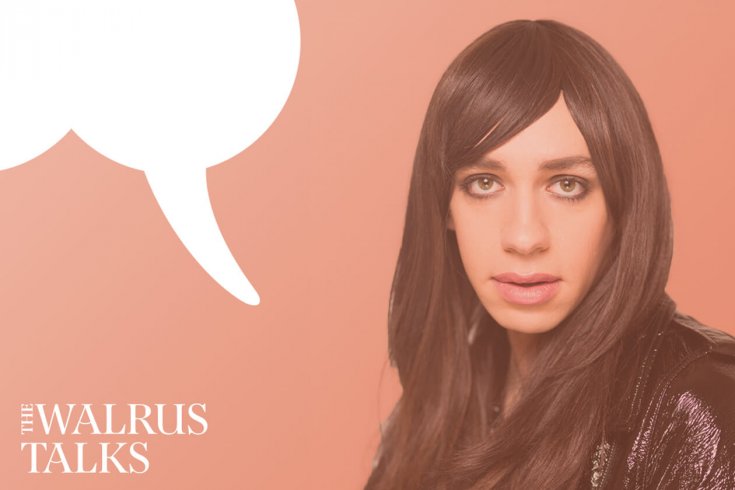Comedian and writer Tranna Wintour says she’s tired of explaining her trans identity and appearance. She believes the gender binary and conventional standards of female beauty are so ingrained in our culture that anyone like her, who does not conform, is seen as a disruption.
You can listen to Wintour’s talk or read it below.
You can watch all The Walrus Talks speakers from this event here: The Walrus Talks Disruption on YouTube
I‘m Tranna Wintour, I’m a comedian, I kind of hate that word. I’m also transgender and I’m a little bit tired of every time I come up on stage having to start with “Hi, I’m transgender.” It’s not like when male comedians get on stage, they have to start by saying “Hi, I’m problematic.”
Thinking about the theme of disruption tonight my mind kept returning to one place, the way that being transgender disrupts the gender binary our culture has imposed and enforced upon us. Side note, I’m not here to represent an entire community, I don’t pretend to speak for the trans community at large, I’m just sharing my own personal thoughts and experiences. There’s no one way or right way of being trans, there tends to be this false idea held by mainstream culture that being trans means being trapped in the wrong body and that’s not always the case. There is so much in between and non-conformity in being trans and that’s why I’ve always associated the word transgender with transcend.
Being trans to me means transcending, transcending labels, expectations, and limitations imposed by the binary of male and female. People and things that transcend or disrupt convention are not always warmly welcomed or understood, to put it mildly. I’ve never understood why people are so afraid of the unknown and part of me kind of thinks it’s hilarious because while bigots fear something as abstract as the unknown me and my trans siblings are scared of getting a very concrete fist in our faces, or worse, for simply being who we are. Who should be scared?
It’s this fear of the unknown that incites strangers to ask me such delightful questions as, “Are you a boy or a girl?” “Do you have a penis?” “What’s your real name, no but like in your everyday life what’s your real name, what do people call you?” “Is that your real hair?” “Have you had surgeries?” And my favorite question: “Are you full-time?” That is the most insanely offensive and ridiculous question. Am I full-time? Am I full-time what? Yes I am a full-time human being 24/7, even though I don’t always feel like being one.
I pretend not to know what they mean by that question, but I know all too well what they’re really asking is do I look, dress, and act like a real girl all the time? It’s as if until I adhere to society’s warped feminine ideal I do not exist. When I’m not wearing makeup or I don’t have my hair done, when I’m just wearing jeans and a T-shirt going about my everyday life, like going to the supermarket, of course I don’t look like the gorgeous supermodel you see before you tonight. This is a two hour process. For the record, even Jennifer Lopez with no makeup on does not look like Jennifer Lopez, she has a team of five working for her.
This fixation on appearance is particularly intense for trans people, there’s a strong pressure to adhere and conform to the one dimensional exaggerated visual codes of masculinity and femininity. When you adhere to these codes or standards you get rewarded as a trans person, you get gendered correctly, people get your pronouns right, you are given attention, and often but not always, acceptance. If you identify as a trans woman but do not adhere to the conventional standards of female beauty all the time, chances are you will be misgendered, you will be seen as confusing, you will be the subject of verbal and sometimes physical violence, you will stick out and be regarded as a disruption.
I‘ve always minimized the experience of being misgendered because I don’t like to admit how much it can hurt. Every time someone refers to me as a guy or refers to me using male pronouns, it stings. It’s a mix of frustration, humiliation, and sometimes outright hurt. If I, for example, have a face-to-face meeting with someone I’ve never met before and it’s like nine in the morning, and I don’t feel like wearing full maquillage, I have to give people a warning and it often goes something like this: “We’re gonna meet today, by the way, I won’t be wearing makeup but that doesn’t mean I’m a boy. I am a trans woman, please use female pronouns when referring to me.” I just hate doing that so much: I hate having to justify how I look and the way that I move through the world. What do I have to do to be seen as the person I am? Am I supposed to be in makeup 24/7, get laser hair removal, have surgeries that I don’t want to have just to make myself more easily understood by people? Why should I have to do any of those things?
To the cisgender people in the room tonight, have you ever had to introduce yourself by saying, “Hi I’m John, I’m a man, please use male pronouns when referring to me.” Have you ever tried to hide at a party or an event or not gone to an event at all because you were too anxious to have to explain your identity or worried you would be misgendered? The reason I’m constantly having to explain and justify my gender identity is again because everyone’s primary view of gender is based on physical appearance. As much as I understand how deeply ingrained the visual codes of male and female are in our culture, it needs to stop. Stop assuming someone’s gender based on the convoluted and limited gender cues our culture has set up. Just because you think someone looks like a boy or a girl doesn’t mean they are. When we meet someone we should ask them what their gender pronouns are, if we did this for everyone it would alleviate so much pressure on trans people, if we all asked each other that question it wouldn’t be so humiliating.
When I first put this talk together I was thinking of my appearance as being a disruption, a disruption to our culture’s arbitrary and insane gender binary. I thought about the ways that I’m rewarded when I adhere to female standards and codes of beauty and the ways that I’m shunned or made to feel awkward when I don’t. In my ideal world there are no labels at all. In my life I am the most comfortable, happy, and at ease when I’m among the people who just see me for me.
When I think about gender and identity, my thoughts often end with what does being male or female even mean or represent? Our ideals of masculinity and femininity are simply inventions, they’re so arbitrary, they are socially constructed prisons designed to control, oppress, and punish nonconformity. And I realized in writing this speech that I am not the disruption, we are not the disruption, it’s our culture’s narrow and oppressive constructs of masculinity and femininity that disrupts the potential limitlessness of our truest selves, trans or not.





